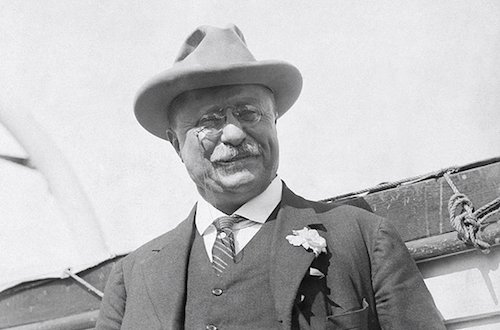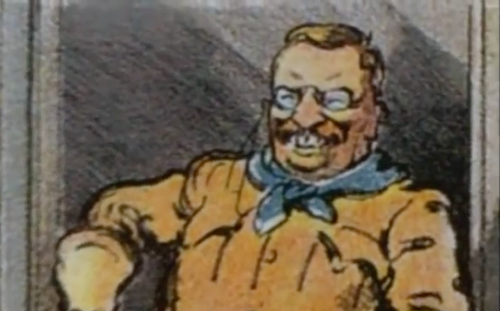Once just a heartbeat away from the presidency, Theodore Roosevelt assumed the Oval Office following the assassination of William McKinley in 1901. His time as president came only after decades of shrewd politics and war heroics, in which he was able to channel his rare charisma into a learned man of the people.
Roosevelt, a conservative who was an advocate of progressive reform, lived above the purgatory of party politics and carved his place into Mt. Rushmore the virtuous way — by doing the best job he could, for all Americans.
His personality is said to have taken over rooms, and he had a sense of national life that pitted “good” versus “evil” in a quest that led Roosevelt to engineer a selfless persona that combatted corporate interests in a time of massive wealth inequality.
That he was an aristocrat himself, might have played a part in it.
Here are five fascinating facts about the 26th President of the United States, Theodore Roosevelt:
His fascinations led him to become a prolific writer

Wikimedia Commons
Early on in life, T.R. became enamored by wildlife and ecology and kept a room full of taxidermy that he himself had preserved. The hobby followed adventures with his father and birding escapades that brought him in contact with nature. That same sense of adventure put Roosevelt in the military, where he would become a “Rough Rider” and Spanish-American War hero.
He would go on to pen around 35 books in his lifetime, but the first to give him credo as a historian and student of war was The Naval War of 1812 (1882). That book subsequently led him into the foray of politics, where he butted heads with establishment figures and spearheaded efforts in the New York legislature to champion a “Square Deal.”
His first love and his mother died on the same day

Wikimedia Commons
“The light has gone out of my life.”
That was Roosevelt’s journal entry on Valentine’s Day in 1884, when his first wife Alice died of complications from child birth and his mother passed away downstairs in the same house from a severe typhoid fever. The tragedy would lead young T.R. to explore the American West and spent his time ranching in the badlands of Dakota.
“He knew that he had to do something to restore his soul. It just devastated him. And he had enough sense — he knew that he had to throw himself into work. He had to be in the outdoors,” says Ted Roosevelt IV, his great-grandson.
He’s the first president to win the Nobel Peace Prize

Wikimedia Commons
Roosevelt drank a gallon of coffee every day. High-wired to perform feats of diplomacy, Roosevelt made the plight in Central America a priority and led the charge on the greatest engineering effort known to man, the Panama Canal, which would connect more humans through trade and bring North and South American governments together over a source of common interests.
“Speak softly, but carry a big stick,” he was fond of saying. After presiding over a great expansion of the American Navy, he would become the leader of developments that ended the Russo-Japanese War. For his efforts, he became the first president to win the Nobel Peace Prize.
He established the National Parks Service as we know it

Wikimedia Commons
“We have become great because of the lavish use of our resources,” Roosevelt said. “But the time has come to inquire seriously what will happen when our forests are gone, when the coal, the iron, the oil, and the gas are exhausted, when the soils have still further impoverished and washed into the streams, polluting the rivers, denuding the fields and obstructing navigation.”
Thus came into being the 1906 American Antiquities Act, which led to the creation of 230 million acres of public land and ensured every American for generations would come to know the natural wonders of the land without interference of private interests and mineral mining.
He was a moderately successful third-party candidate

YouTube/Screen grab
His first four years as president were served following the death of McKinley. And with no law on the books saying Roosevelt couldn’t serve a third term, the Old Lion asked his handpicked successor William Taft to move over after one term as the Republican president.
Taft refused, and when T.R. lost the GOP nomination, he created the Bull Moose Party and won 27 percent of the popular vote — more than Taft, but less than their Democratic counterpart, Woodrow Wilson. The outbreak of World War I followed shortly thereafter and a 58-year-old Roosevelt would lobby President Wilson to send him on an expedition to France in charge of 200,000 infantrymen.
It wouldn’t happen, and the war would claim one of his sons. Heartbroken but popular as ever, he could have challenged the nomination in 1920. But complications from malaria contracted during an African expedition led to his untimely death in 1919 at just 60 years of age.
